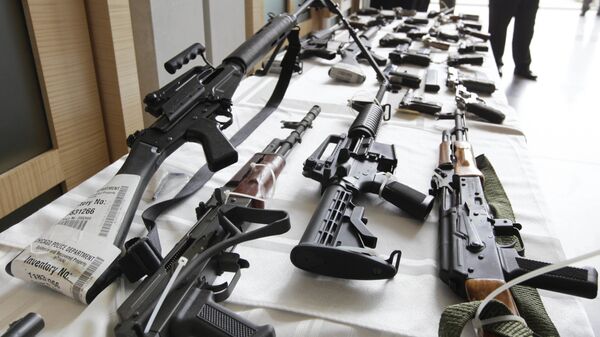This comes after a June settlement between the US government and the Defense Distributed group. In 2013, Cody Wilson, who describes himself as a post-left anarchist, posted plans for a 3-D printed handgun called “The Liberator.”
Radio Sputnik has discussed the decision by US judges to allow publishing blueprints for 3-D printable guns online with Dr. James Jacobs, Director of the Center for Research in Crime and Justice at the New York University School of Law.
Sputnik: What's your take on the decision made by the US court with regard to this gentleman, Cody Wilson, and the Defense Distributed group?
James Jacobs: I'm not really surprised. It's in line with the US First Amendment law. People have published all kinds of plans for certain kinds of bombs and weapons and put those on the Internet. So this is not really surprising.
READ MORE: Toronto Mayor Calls for Stricter Gun Control After Deadly Mass Shooting
Sputnik: Blueprints could be published as early as in August; once they're published what will follow? How high do you expect the demand will be?
James Jacobs: I don't think it'll be very high at all because it's so easy to purchase manufactured firearms in the US, well-produced and well-functioning firearms. These are mostly plastic and are 3-D printed. They're more like a curiosity.
James Jacobs: Yes, it is. And before the settlement, Cody Wilson and his company were able to sell the plans or give the plans to anyone who wanted them. They were only prohibited from posting them on the Internet under the law about exporting weapons. And the government's argument was by putting them on the Internet, in effect they were exporting them to foreign countries. But he had the right to give or sell them to anyone in the US, so in effect, the plans are widely available to anyone who wants them and who has a 3-D printer.
Sputnik: There's got to be some concern about it. You're the second person, an expert I've spoken to and both yourself and the previous expert were saying that really this will not have any effect with regard to individuals printing these guns; these are plastic guns, there are only a couple of metal parts.
But surely there's got to be some concern. For example, teenagers being able to access these guns because there's no registration required for them. So a young teenager who maybe has a mental disorder could potentially print these guns and go and use them. Do you have any comment with regard to that?
READ MORE: Wild, Wild West: Las Vegas Officer Involved in Rolling Gun Battle (VIDEO)
James Jacobs: It undermines the effort to keep guns out of the hands of dangerous people. So it's another way for a person who is disqualified from purchasing a gun to can get his or her hands on one. They could print them themselves, but there are so many ways that a teenager or any other disqualified person could get their hands on a gun. This only adds one more marginal way to do it.
Sputnik: What regulations do you think they need to be put in place with regard to control of this practice? Before we discussed the regulations of guns, it's not going to happen, is it?
James Jacobs: I think it's very difficult to imagine any effective regulation at this point in American history where guns are so readily available. The fact that these are plastic is another issue because plastic guns may be easier to use on an airplane or for some kind of assassination in the hands of terrorists. So that's another problem that these weapons represent.
James Jacobs: They could try to do that; whether that would pass the court is a question. California requires that all guns have to get a serial number, so if you're going to make a gun then you have to apply to the Attorney General of the state and get a serial number and place it on the gun. But will people comply with that?
It would be easy not to comply with it, just make the gun and not comply with it. And also another interesting point here is that people have always made their own guns. There have always been gunsmiths who make guns from scratch or out of kits that don't have serial numbers. They are called ghost guns as you've mentioned.
The views and opinions expressed by the expert do not necessarily reflect those of Sputnik.



